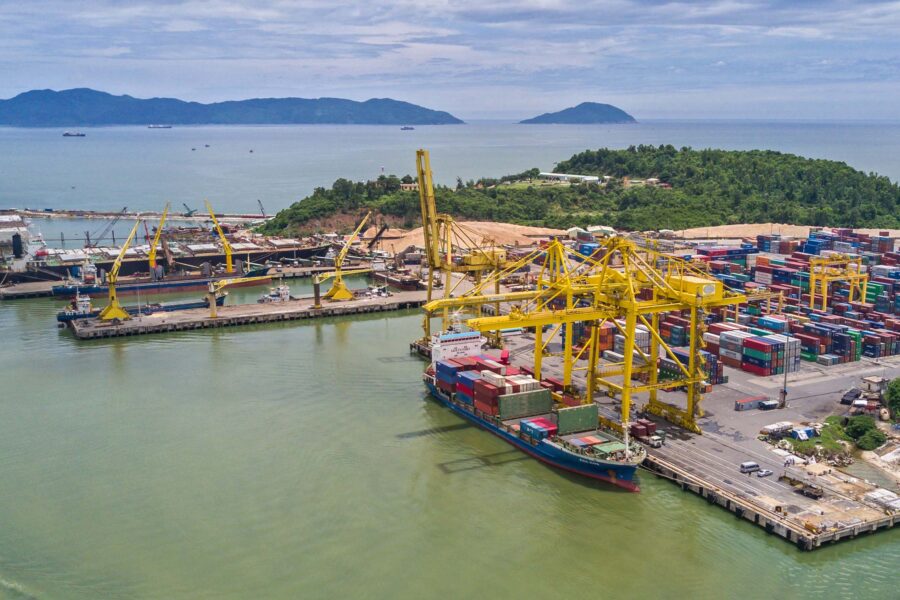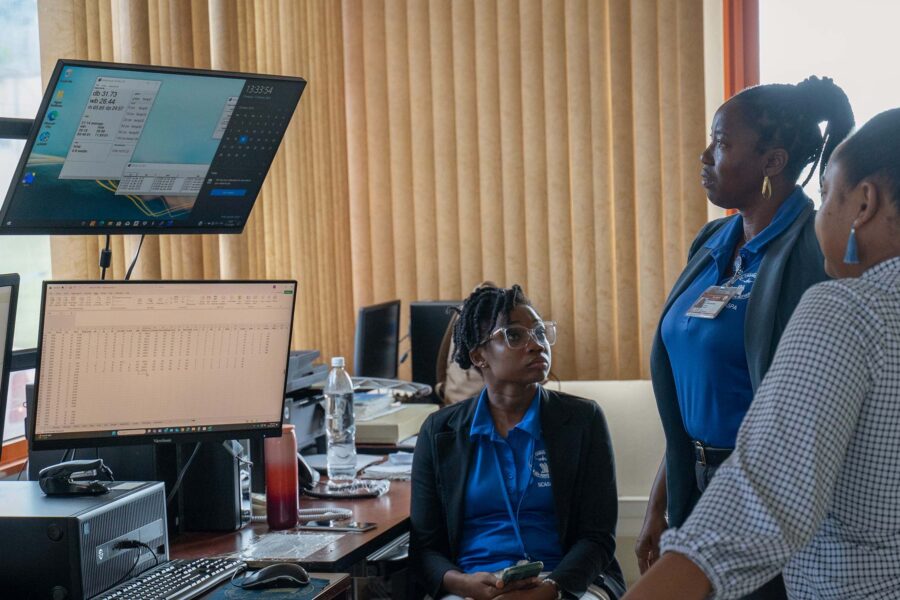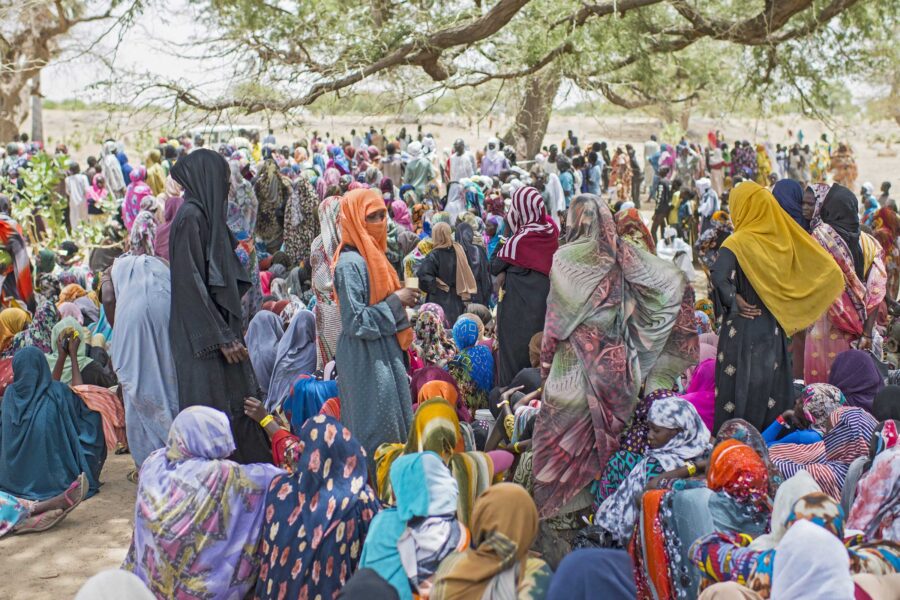Africa’s call for action on adaptation at COP28
African nations have thrown down a united challenge to the world: developed countries must urgently partner with the continent to support a rapid increase in climate adaptation and sustainable development. After too many climate summits that have achieved agreement but fallen short on implementation, Africa needs COP28 to deliver on both
Climate — Middle East and Northern Africa, Sub-Saharan Africa
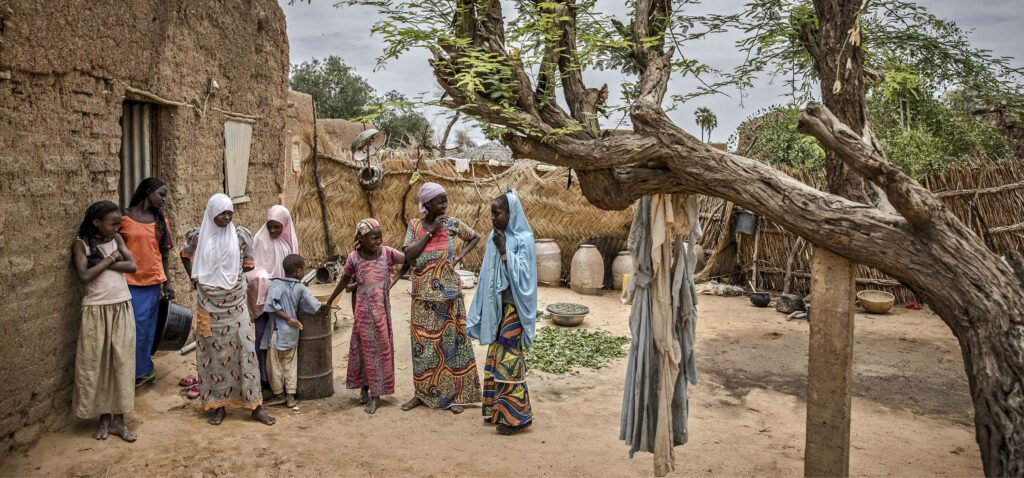
The global climate discourses and their coalitions are changing, with Africa now at the center of discussions. Two months after the inaugural Africa Climate Summit in Kenya in September 2023, many experts are still reflecting on the summit’s key outcomes, particularly for Africa’s position as we head to the 28th Conference of the Parties (COP28) in the United Arab Emirates. The summit’s primary agenda was to change the discourse that frames Africa as a continent of “being helped” to one of “being partnered with” to take actions for global benefits.
The Africa Climate Summit was clear about its objective of presenting an Africa that is looking at a climate-positive growth trajectory: an Africa that sees itself as part of the global climate solutions framework. As an innovative, multi-stakeholder convergence of its kind, the summit catalyzed actions and strategic partnerships for accelerating the implementation of the nationally determined contributions (NDCs) of its 54 member countries. More importantly, the summit underscored the importance of adaptation and resilience-building as the central priorities for African households, communities, and governments.
As the global community looks forward to COP28, Africa is prepared for a more deliberate engagement with the rest of the world. The key topical issues for negotiation at COP28 are of deep interest to the continent, as they relate to NDC implementation. They include:
- the new collective quantified goal on climate finance
- just energy transition partnerships
- the global goal on adaptation (GGA)
- loss and damage
- nature-based solutions
- carbon markets
- the global stocktake (GST)
To assess global progress on climate action following the Paris Agreement, countries are required to conduct a GST, commencing this year (2023) and recurring every five years. The first GST, released last month, reported that we are not on track to achieve the 2015 Paris goals. The parties will negotiate a collective response to the GST findings at COP28. More importantly, insights from these GST findings could have implications on NDC implementation in-country, particularly on national adaptation actions, which remain the ultimate priority for Africa.
When it comes to adaptation within the GST under the Paris Agreement, two key elements of adaptation resonate deeply with Africa. The first relates to the adequacy and effectiveness of adaptation actions at national and local levels in reducing vulnerability to climate risks and shocks. The second relates to adaptation financing flows, both in quality and quantity, from developed countries to finance transformational adaptation interventions in Africa.
Elevating transformational adaptation actions in Africa
Many African countries are making progress with either developing or implementing their National Adaptation Plans (NAPs), which is linked to their NDC implementation. Ahead of COP28, African negotiators are keen to have the GST recognize the intrinsic links between adaptation and sustainable development. Climate impacts undermine efforts across all the Sustainable Development Goals (SDGs), while implementing the SDGs enhances national and local adaptive and resilience capacities against climate change. That is why the effectiveness of adaptation actions (including elements of risks and vulnerability, planning, implementation, and financing) may not be left to African countries alone.
As we head to COP28, African stakeholders are currently advocating for a GST outcome that supports the operationalization of the GGA in three specific ways. First, Africa remains consistent in its request for a development space and predictable means of adaptation implementation as the continent seeks to transition its climate-vulnerable economies and sectors into resilient development pathways. Second, the widening adaptation implementation gaps in many developing countries undermine global climate actions. The Intergovernmental Panel on Climate Change pointed to the scarcity of multiple, transformational adaptation projects. At the same time, countries continue to lose 5% to 15% of their gross domestic product (GDP) to climate change, according to the African Economic Outlook 2022. Third, the anticipated GST decision at COP28 should adopt targets, indicators, and monitoring systems for adaptation action under the GGA framework.
Scaling up adaptation finance in Africa
The big elephant in the room is adaptation finance. At previous COPs, African delegations have pushed for key negotiations on scaling up adaptation finance flows to the continent. Sadly, even when negotiations or agreements have succeeded, implementation has often failed. A case in mind is the USD 100 billion per year committed by developed countries to support climate actions in developing countries during COP15 in Copenhagen in 2009, which is still to be fully mobilized. Financial resources have not matched political commitments and ambition for climate adaptation in Africa.
Global climate finance continues to be skewed primarily towards mitigation efforts, which received 91% of the total USD 1.27 trillion climate finance flows in 2021/22, according to the Global Landscape of Climate Finance 2023 published by the Climate Policy Initiative. Adaptation finance received a total of USD 63 billion, up 28% from USD 49 billion in 2019/20. But this still falls short of the estimated needs of about USD 300 billion annually for developing countries alone. On regional distribution, the 50 sub-Saharan African countries received a total of USD 30 billion from both public and private capital. On a positive note, these African countries collectively strike a more balanced spread of financing across climate action areas, with mitigation accounting for 49% of climate finance flows, followed by 39% toward adaptation, and 12% to the dual benefits of both mitigation and adaptation.
Africa has 17% of the global population but contributes just 3.6% of global emissions. It is the most vulnerable to the effects of climate change, yet has received only 3.2% of the global climate finance. Here then is the paradox: the region that needs the most financial resources to respond to the climate crisis receives the least. This is happening at a time when countries’ vulnerabilities are increasing as climate impacts are escalating. This is the real crisis of finance.
Figure 1: Destination region of public and private climate finance
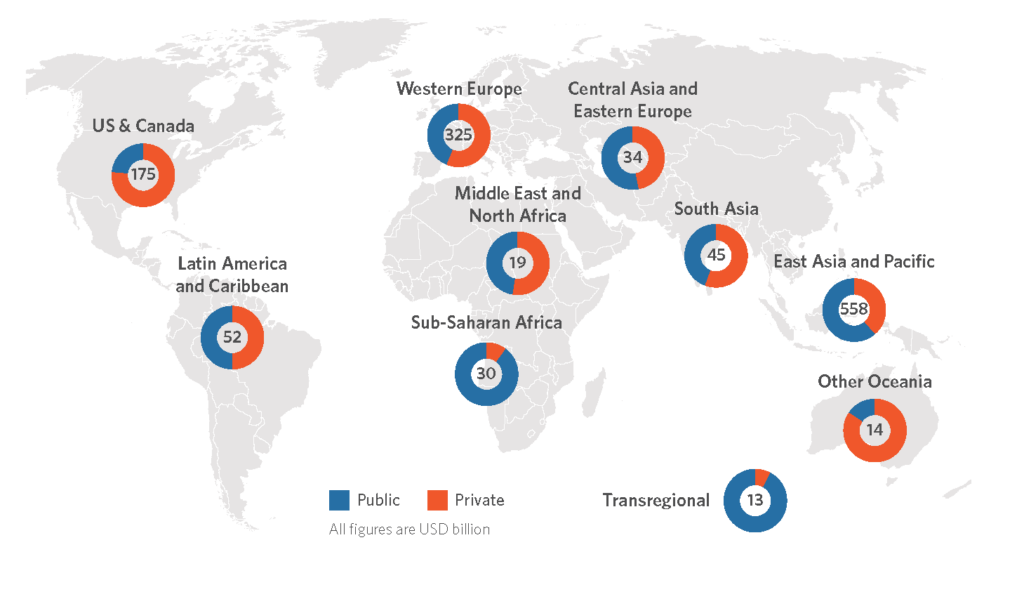
Source: Global Landscape of Climate Finance 2023, Climate Policy Initiative
In our opinion, the cruxes of Africa’s adaptation finance crisis in relation to NDC implementation constitute three interrelated points for reflection ahead of COP28 – a summit for which expectations of success are extremely high. The first relates to the total amount of climate finance. Current estimates of the adaptation finance gap in Africa are five to ten times more than the current international flows to Africa. The second relates to the significant impact of lack of private capital for adaptation. Private capital, admittedly, is the difference between mitigation and adaptation finance, not public capital. And the third relates to the criticality of achieving parity between mitigation and adaptation finance if we are serious about meeting global climate goals.
Figure 2: Uses of climate finance with private-public splits
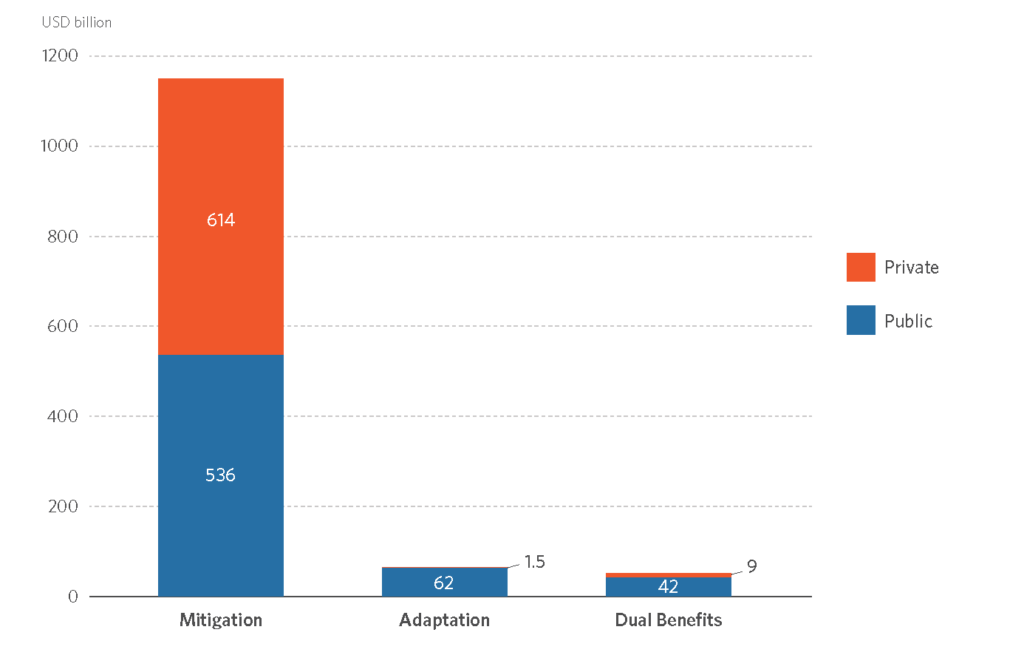
Source: Global Landscape of Climate Finance 2023, Climate Policy Initiative
African leaders and key stakeholders at the Africa Climate Summit called upon the international community to partner with Africa in combating climate change. The continent already spends up to 10% of its GDP on climate response efforts. The summit called for bold and innovative financial mechanisms and instruments to restructure the global financial system that is currently tilted against Africa. The Africa-Europe Foundation also emphasizes the need to reform the outdated system, stating:
“Today’s challenge is thus to reform a system that dates back to the 1940s, ensure it is fair, agile, and effective in the disbursement of funds, and bolster it through new sources of investment to match needs.”
The upcoming COP28 GST and the recent Paris Summit for a New Global Financing Pact provide the ideal space for achieving a deep course correction, particularly in the redesign of climate finance governance with a focus on adaptation.
Finally, one of the key conversations emanating from the summit concerning adaptation finance flows is the need to develop a new “Compact for Africa’s Climate Resilience” in which our NDCs and NAPs must transform into attractive investment opportunities. The African Development Bank, along with other development partners, remains committed to championing this at COP28 and beyond.
Looking ahead
African stakeholders recognize and prioritize the intersectionality between climate adaptation and the SDGs. The GST calls for transformative adaptation and urgency in climate mitigation. More importantly, this is a race against time. The science is clear: humanity is at the brink of a societal collapse if global climate actions are not rapidly accelerated in terms of scale and speed.
The Nairobi Declaration on Climate Change from the Africa Climate Summit serves as a basis for Africa’s common position in the global climate process to COP28 and beyond. The declaration details African leaders’ commitment to propelling Africa’s economic development in climate-resilient and low-carbon pathways. This will happen through investing in policies, regulatory frameworks, planning, and programs consistent with the NDCs in all African countries.
But more commitment is urgently needed. Africa seeks new strategic partnerships that provide scalable financing mechanisms to support existing and new transformative adaptation interventions. For most Africans, the success of COP28 will be judged by its clarity on an international cooperation framework that truly puts Africa at the center of a financial flow system to drive a low-carbon and climate-resilient development.



